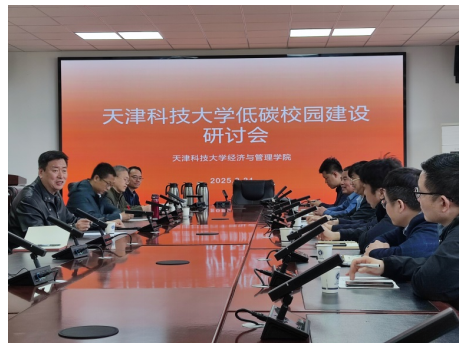
Tianjin University of Science and Technology Successfully Hosts Low-Carbon Campus Development Symposium
Tianjin University of Science and Technology Successfully Hosts Low-Carbon Campus Development Symposium
2025-04-03
On the morning of March 31, 2025, a seminar on low-carbon campus construction of Tianjin University of Science and Technology (TUST) was held in the conference room of the College of Economics and Management on Hexi Campus. The meeting was hosted by Prof. Song Youtao, Dean of the College of Economics and Management of Tianjin University of Science and Technology. Representatives from the Institute of Environmental Energy Research of the Mechanical Industry Economics and Management Research Institute, 3060 Zero Carbon Industry Base, China Railway Construction and Development Group, Tianjin Branch of China Railway Shanghai Design Institute, and other units as well as experts in low-carbon research within the university participated in the seminar, discussing the path of technological research and cooperation between the industry, academia, and research on the low-carbon campus.
Wang Qikun, industrial professor of Carbon Neutral Research Institute of Tianjin University of Science and Technology, introduced that Tianjin University of Science and Technology provides data support for the development of low carbon campus standards in Tianjin through the practice of ground source heat pump demonstration building and green plant carbon sink analysis. Mr. Jian Haiqiang, director of the Environmental Energy Institute of the Tianjin Branch of China Railway Shanghai Design Institute Group Co., Ltd, took the renovation of the Dabizhuang Vehicle Section as an example to show the carbon reduction effect of the integrated application of distributed photovoltaic and intelligent platform, and proposed to introduce the integration of source, network, load, and storage technology into the construction of low-carbon campus. 3060 Zero Carbon Industry. Liu Xuan, Director of 3060 Zero Carbon Industrial Base, pointed out that there are problems such as insufficient technology integration and lack of standards in the current market, and suggested that Tianjin University of Science and Technology should be the core pilot to build an R&D-verification-promotion whole chain model.
Zhang Yanwei, executive director of the Environmental Energy Research Institute of the Mechanical Industrial Economics and Management Research Institute, emphasized that scientific research projects need to focus on core technology research and development and industrial transformation and promote the formation of replicable low-carbon campus solutions through the integration of research teams and market resources. Chen Zhiqi, Investment Director of the North China Regional Command of China Railway Construction and Development Group Limited, said that the group will support the research of energy storage technology and share resources in the fields of wastewater treatment and solid waste resourceization.
Song Youtao, dean of the College of Economics and Management, proposed to strengthen joint scientific research, build a smart energy dynamic monitoring and optimization system, focus on real-time tracking of campus carbon emissions and efficiency improvement, and cooperate to build technical application scenarios to form a scalable low-carbon management program. President Song Youtao concluded that the university will rely on the existing scientific research platform and university-enterprise synergy mechanism to promote the intelligent transformation of the campus energy system in phases, and ultimately achieve the goal of campus carbon neutrality.
The meeting specified three actions: building demonstration projects for low-carbon technology integration, jointly formulating industry technical specifications, and exploring new modes of university-enterprise cooperation. Participating experts agreed that universities should become the “first place” for low-carbon technologies, and the exploration of Tianjin University of Science and Technology will provide a replicable experience for the green transformation of campuses nationwide. The seminar pressed the accelerator button for the deep integration of industry, academia, and research through technology attack, standardization, and mechanism innovation.


